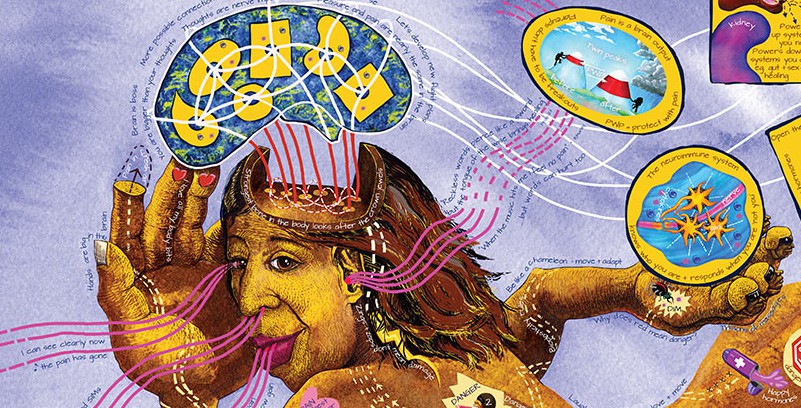From The Conversation recently:
How music can help relieve chronic pain
As the 17th-century English playwright William Congreve said: “Music has charms to soothe a savage breast.” It is known that listening to music can significantly enhance our health and general feelings of well-being.
Music attracts and holds our attention and is emotionally engaging, particularly if our relationship with the piece is strong. Our favourite music is likely to have stronger positive effects than tracks we don’t like or know. Researchers have demonstrated that the music we prefer has greater positive effects on pain tolerance and perception, reduces anxiety and increases feelings of control over pain. In older people with dementia, listening to preferred music has been linked with decreasing agitated behaviour.
There is also much to study, however. We may know that the music we like can help with the negative symptoms of pain, but key mechanisms are still not fully understood. If being emotionally engaged with music is key to maximising our distraction in this regard, there are myriad factors affecting our emotional relationship with music that we need to understand.
These include the personal meaning and memories that the music conjures for a particular individual, the context the listener is in and factors such as age, gender, occupation and identity.” (emphasis added)
Safety in music
Music can be a powerful SIM, and as the emphasised section above highlights, like any DIM or SIM, it is the context of the music/listener- that will determine the DIM or SIM status.
We’re probably at the edge of the science here, but, we often suggest that people seek music that they enjoyed before their troubles started – to access memories/neurotags/states of being that are ‘uncontaminated’ by persistent pain states.
Equally, non-preferred music, or even music that is a DIM for an individual, can be used to add challenge to a graded exposure program. We’ve had some clever clinicians tell us about the power of just changing a radio station as their patients undertake exercise.
There are also links to healthy creativity – in the sense that listening to music, not just composing or performing music, can be creative.
Finding SIMs in the lyrics
One of our favourite sayings at NOI comes from the lyrics of Bob Marley’s Trenchtown Rock
One good thing about music, when it hits you feel no pain
So of course we had to ‘hide’ a reference on Sarah-Bella, can you find it?

…when it hits you feel no pain
Finally, here’s a bit of Bob to enjoy, live at the One Love Peace Concert in 1978
We love hearing stories of musical SIMs – there’s a comments section below – feel free to use it.
-Tim Cocks

Nancy Sinatra’s “these boots are made for walking” can get me going. I just have to look at my boots and sing a few lines before I put them on!
David
From an early age music was and still is my sanctuary were the Sims rule over the Dims. Motown was the sound of the time and remains a major Sim in my life…..
http://youtu.be/CwB40qTfuvI
DB
London😎😎😎
Thanks David
Brilliant lnk – never has a song about pacing and graded exposure been so sexy…😜
The bit that I really liked in the original piece was the notion that music may help those with dementia. I’ve often been asked on courses and via noi feedback about EP, and more recently Protectometer, use in client populations where communication is difficult/not possible – “how can we Explain Pain, or explore DIMs and SIMs with people who experience dementia, or those with intellectual disabilities” etc etc. Firstly, the Protectometer idea assists with the idea that anything can be a SIM – the environment, stable routine, loving touch, comforting words and tone, a smile and so on. Secondly, this bit of evidence suggests that music (“how do I know what music to play?” – ask, ask a family member, experiment and observe…) can also be used as a powerful SIM. Having worked in residential care and taking my kids to see their great grandmother, I’ve seen the beautiful power of singing and music to comfort and relieve. But, knowing you, I know I’m preaching at the choir…
TC
NOI HQ (barely holding the place together with the boss away 😁😉)
I’m not sure about listening to music, but for me making music with others is the biggest SIM possible. Singing a harmony with someone or playing an instrument (for me simple guitar) with one or more people is the most connected and grounding feeling I have ever experienced. My technical skill doesn’t allow too much, but if I can let go of my self consciousness and concentrate enough to allow the music to flow through me, it feels like I’m part of something greater that I can’t describe in words. I always come away feeling clear in the head, like I’ve been meditating deeply, and all the worries of the world have faded to nothing.